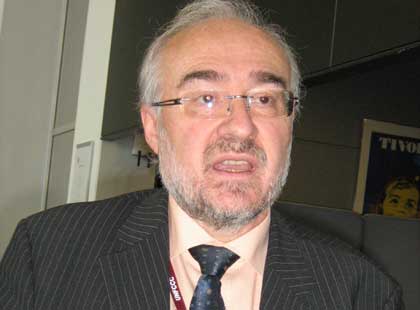
Interview With Michel Jerraud,
World Meteorological Organization Chief
By Marianne de Nazareth
09 December, 2009
Countercurrents.org
Copenhagen: The World Meteorological Organization has been instrumental in facilitating and coordinating the contributions of the National Meteorological and Hydrological Services to assist Parties to the United Nations Framework Convention on Climate Change (UNFCCC) to fulfill their obligations under the Convention. In an interview with Marianne de Nazareth during the Climate Change negotiations being held in Copenhagen, Michel Jerraud the secretary general of the WMO responds to questions on the problems of Climate Change.
The WMO states that 2000 – 2009 is the warmest decade on record. Comment.
The year 2009 is likely to rank in the top 10 warmest on record since the beginning of instrumental climate records from 1850, according to data sources compiled by the WMO. The global combined sea surface and land surface air temperature for 2009 ( January to October) is currently estimated at 0.44 degrees C plus or minus 0.11 degrees C above the 1961 – 1990 annual average of 14.00 C or 57.2 degrees F. The current nominal ranking of 2009 which does not account for uncertainties in the annual averages places it as the fifth warmest year. The decade of the 200’s (2000 – 2009) was warmer than the decade spanning the 1990’s (1990- 1999) which in turn was warmer than the 1980’s (1980 – 1989) More complete data for the remainder of the year 2009 will be analysed at the beginning of 20010 to update the current assessment.
Where were the above normal temperatures recorded in the world?
This year above normal temperatures were recorded in most continents. Only North America (US and Canada) experienced conditions that were cooler than average. Given the current figures large parts of Southern Asia and central Africa are likely to have the warmest year on record. Climate extremes including devastating floods severe droughts, snowstorms heat waves and cold waves were recorded in many parts of the world. This year the extreme warm events were more frequent and intense in Southern South America, Australia and southern Asia in particular. The Arctic sea ice extent during the melt season ranked the third lowest after the lowest and second lowest records set in 2007 and 2008 respectively. According to scientific measurements the Arctic sea ice has declined dramatically over the past 30 years.
India had an extreme heat wave in May which caused 150 deaths. A heat wave hit northern China in June with daily maximum temperature records above 40 degrees C. In Asia after the weak monsoon season, southern India recorded flooding due to incessant rain in late September and early October and more than 250 lives were lost.
Could you please comment on the melting glacier controversy going on in India. Are they or aren’t they melting.
The glaciers are indeed melting in the Himalayas as is in most parts of the world. What is causing devastation are the GLOFS ( Glacier Lake Outburst Floods) which are devastating the human habitations there. The main problem faced by the area will be the problem of fresh water once these glaciers, which are massive water store houses melt away. Since the glaciers in India do go up to higher levels there is hope for the higher level ones to be maintained with the cutback in CO2 emissions.
(Marianne de Nazareth is a fellow with the UNFCCC and is reporting from Copenhagen)


